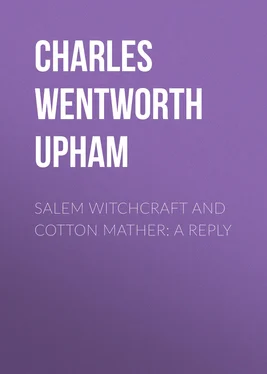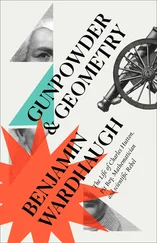Charles Wentworth Upham - Salem Witchcraft and Cotton Mather - A Reply
Здесь есть возможность читать онлайн «Charles Wentworth Upham - Salem Witchcraft and Cotton Mather - A Reply» — ознакомительный отрывок электронной книги совершенно бесплатно, а после прочтения отрывка купить полную версию. В некоторых случаях можно слушать аудио, скачать через торрент в формате fb2 и присутствует краткое содержание. Жанр: foreign_prose, История, foreign_edu, foreign_antique, на английском языке. Описание произведения, (предисловие) а так же отзывы посетителей доступны на портале библиотеки ЛибКат.
- Название:Salem Witchcraft and Cotton Mather: A Reply
- Автор:
- Жанр:
- Год:неизвестен
- ISBN:нет данных
- Рейтинг книги:3 / 5. Голосов: 1
-
Избранное:Добавить в избранное
- Отзывы:
-
Ваша оценка:
- 60
- 1
- 2
- 3
- 4
- 5
Salem Witchcraft and Cotton Mather: A Reply: краткое содержание, описание и аннотация
Предлагаем к чтению аннотацию, описание, краткое содержание или предисловие (зависит от того, что написал сам автор книги «Salem Witchcraft and Cotton Mather: A Reply»). Если вы не нашли необходимую информацию о книге — напишите в комментариях, мы постараемся отыскать её.
Salem Witchcraft and Cotton Mather: A Reply — читать онлайн ознакомительный отрывок
Ниже представлен текст книги, разбитый по страницам. Система сохранения места последней прочитанной страницы, позволяет с удобством читать онлайн бесплатно книгу «Salem Witchcraft and Cotton Mather: A Reply», без необходимости каждый раз заново искать на чём Вы остановились. Поставьте закладку, и сможете в любой момент перейти на страницу, на которой закончили чтение.
Интервал:
Закладка:
Charles Wentworth Upham
Salem Witchcraft and Cotton Mather: A Reply
PREFATORY NOTE
The Editors of the North American Review would, under the circumstances, I have no reason to doubt, have opened its columns to a reply to the article that has led to the preparation of the following statement. But its length has forbidden my asking such a favor.
All interested in the department of American literature to which the Historical Magazine belongs, must appreciate the ability with which it is conducted, and the laborious and indefatigable zeal of its Editor, in collecting and placing on its pages, beyond the reach of oblivion and loss, the scattered and perishing materials necessary to the elucidation of historical and biographical topics, whether relating to particular localities or the country at large; and it was as gratifying as unexpected to receive the proffer, without limitation, of the use of that publication for this occasion.
The spirited discussion, by earnest scholars, of special questions, although occasionally assuming the aspect of controversy, will be not only tolerated but welcomed by liberal minds. Let champions arise, in all sections of the Republic, to defend their respective rightful claims to share in a common glorious inheritance and to inscribe their several records in our Annals. Feeling the deepest interest in the Historical, Antiquarian, and Genealogical Societies of Massachusetts, and yielding to none in keen sensibility to all that concerns the ancient honors of the Old Bay State and New England, generally, I rejoice to witness the spirit of a commemorative age kindling the public mind, every where, in the Middle, Western and Southern States.
The courtesy extended to me is evidence that while, by a jealous scrutiny and, sometimes, perhaps, a sharp conflict, we are reciprocally imposing checks upon loose exaggerations and overweening pretensions, a comprehensive good feeling predominates over all; truth in its purity is getting eliminated; and characters and occurrences, in all parts of the country, brought under the clear light of justice.
The aid I have received, in the following discussion, from the publications and depositories of historical associations and the contributions of individuals, like Mr. Goodell, Doctor Moore, and others, engaged in procuring from the mother country and preserving all original tracts and documents, whenever found, belonging to our Colonial period, demonstrate the importance of such efforts, whether of Societies or single persons. In this way, our history will stand on a solid foundation, and have the lineaments of complete and exact truth.
Notwithstanding the distance from the place of printing, owing to the faithful and intelligent oversight of the superintendent of the press and the vigilant core of the compositors, but few errors, I trust, will be found, beyond what are merely literal, and every reader will unconsciously, or readily, correct for himself.
C. W. U.Salem, Massachusetts.
INTRODUCTION
An article in The North American Review , for April, 1869, is mostly devoted to a notice of the work published by me, in 1867, entitled Salem Witchcraft, with an account of Salem Village, and a history of opinions on witchcraft and kindred subjects . If the article had contained criticisms, in the usual style, merely affecting the character of that work, in a literary point of view, no other duty would have devolved upon me, than carefully to consider and respectfully heed its suggestions. But it raises questions of an historical nature that seem to demand a response, either acknowledging the correctness of its statements or vindicating my own.
The character of the Periodical in which it appears; the manner in which it was heralded by rumor, long before its publication; its circulation, since, in a separate pamphlet form; and the extent to which, in certain quarters, its assumptions have been endorsed, make a reply imperative.
The subject to which it relates is of acknowledged interest and importance. The Witchcraft Delusion of 1692 has justly arrested a wider notice, and probably always will, than any other occurrence in the early colonial history of this country. It presents phenomena in the realm of our spiritual nature, belonging to that higher department of physiology, known as Psychology, of the greatest moment; and illustrates the operations of the imagination upon the passions and faculties in immediate connection with it, and the perils to which the soul and society are thereby exposed, in a manner more striking, startling and instructive than is elsewhere to be found. For all reasons, truth and justice require of those who venture to explore and portray it, the utmost efforts to elucidate its passages and delineate correctly its actors.
With these views I hail with satisfaction the criticisms that may be offered upon my book, without regard to their personal character or bearing, as continuing and heightening the interest felt in the subject; and avail myself of the opportunity, tendered to me without solicitation and in a most liberal spirit, by the proprietor of this Magazine, to meet the obligations which historical truth and justice impose.
The principle charge, and it is repeated in innumerable forms through the sixty odd pages of the article in the North American , is that I have misrepresented the part borne by Cotton Mather in the proceeding connected with the Witchcraft Delusion and prosecutions, in 1692. Various other complaints are made of inaccuracy and unfairness, particularly in reference to the position of Increase Mather and the course of the Boston Ministers of that period, generally. Although the discussion, to which I now ask attention, may appear, at first view, to relate to questions merely personal, it will be found, I think, to lead to an exploration of the literature and prevalent sentiments, relating to religious and philosophical subjects, of that period; and, also, of an instructive passage in the public history of the Province of Massachusetts Bay.
I now propose to present the subject more fully than was required, or would have been appropriate, in my work on Witchcraft.
I
In the first place, I venture to say that it can admit of no doubt, that Increase Mather and his son, Cotton Mather, did more than any other persons to aggravate the tendency of that age to the result reached in the Witchcraft Delusion of 1692. The latter, in the beginning of the Sixth Book of the Magnalia Christi Americana , refers to an attempt made, about the year 1658, "among some divines of no little figure throughout England and Ireland, for the faithful registering of remarkable providences. But, alas," he says, "it came to nothing that was remarkable. The like holy design," he continues, "was, by the Reverend Increase Mather, proposed among the divines of New England, in the year 1681, at a general meeting of them; who thereupon desired him to begin and publish an Essay; which he did in a little while; but there-withal declared that he did it only as a specimen of a larger volume, in hopes that this work being set on foot, posterity would go on with it." Cotton Mather did go on with it, immediately upon his entrance to the ministry; and by their preaching, publications, correspondence at home and abroad, and the influence of their learning, talents, industry, and zeal in the work, these two men promoted the prevalence of a passion for the marvelous and monstrous, and what was deemed preternatural, infernal, and diabolical, throughout the whole mass of the people, in England as well as America. The public mind became infatuated and, drugged with credulity and superstition, was prepared to receive every impulse of blind fanaticism. The stories, thus collected and put everywhere in circulation, were of a nature to terrify the imagination, fill the mind with horrible apprehensions, degrade the general intelligence and taste, and dethrone the reason. They darken and dishonor the literature of that period. A rehash of them can be found in the Sixth Book of the Magnalia . The effects of such publications were naturally developed in widespread delusions and universal credulity. They penetrated the whole body of society, and reached all the inhabitants and families of the land, in the towns and remotest settlements. In this way, the Mathers, particularly the younger, made themselves responsible for the diseased and bewildered state of the public mind, in reference in supernatural and diabolical agencies, which came to a head in the Witchcraft Delusion. I do not say that they were culpable. Undoubtedly they thought they were doing God service. But the influence they exercised, in this direction, remains none the less an historical fact.
Читать дальшеИнтервал:
Закладка:
Похожие книги на «Salem Witchcraft and Cotton Mather: A Reply»
Представляем Вашему вниманию похожие книги на «Salem Witchcraft and Cotton Mather: A Reply» списком для выбора. Мы отобрали схожую по названию и смыслу литературу в надежде предоставить читателям больше вариантов отыскать новые, интересные, ещё непрочитанные произведения.
Обсуждение, отзывы о книге «Salem Witchcraft and Cotton Mather: A Reply» и просто собственные мнения читателей. Оставьте ваши комментарии, напишите, что Вы думаете о произведении, его смысле или главных героях. Укажите что конкретно понравилось, а что нет, и почему Вы так считаете.












